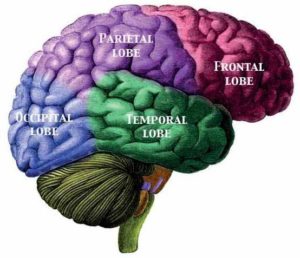
You know that gesture that, in moments of shock and overwhelm, we humans worldwide do to soothe ourselves? Hand to forehead! Try it now. Soothing, isn’t it? In so doing, we intuitively embrace and protect a vital part of our brain, one that governs among many, many things, our will itself. Oh, not the passion, nor the drive…that lives further back. But the ability to plan, to commit, to move forward or hold back, depending upon what’s most prudent, driving us along the best (at least to our understanding) road to our chosen goal, and avoiding tempting detours.
People, meet the seat of all well-planned and fulfilled activity: Our frontal lobe and its recent addendum, the prefrontal cortex (PFC). It’s a busy instrument, and quite complex. The PFC’s also a latecomer to the evolution of us human animals, being only about 40,000 years old.
When we’re born, it should come as no surprise, we’re not all there. Literally. Our gastric system isn’t fully developed, we don’t see well, and the very front of our brain has barely started its development. After two growth spurts, one in the first year and one at about the fifteenth, our PFC becomes fully developed in the later part of our 20’s. Because we know this now, there’s an additional argument on the table for different sentencing of juvenile offenders. We also know that, if children are not cared for properly, it can seriously impact the development of the frontal lobe. Never fear, we also are beginning to understand neuroplasticity, that ability even in adulthood to heal and rewire the brain and overcome our early history’s shortcomings.
What does this relatively small chunk of brain do? One side allows us the will, the motivation, to act; the other, the power to say no. It allows us to think ahead, then figure out what steps are needed to reach our goal, and to take those steps. It considers the consequences. If I’m tired most of the time, I might find the couch and the remote looking lovely, but my brain, if it’s relatively healthy, will shake its figurative finger at me (not telling which one) and say, lack of exercise will only make you more tired. You want more energy. No couch! No remote! Jogging shoes! Door! GO!!! It also allows us to bypass immediate gratification for long-range, more durable satisfaction. Keeping those consequences in mind also deters antisocial behavior, s, reminding us for example of what will happen when we’re caught in the lie that comes glibly to our lips. Many kids are labeled “bad” who have the misfortune of undiagnosed or untreated Attention Deficit Disorder, which is a disorder specific to our friend, the frontal lobe and the PFC.
Next week: how to strengthen that selfsame lobe.
